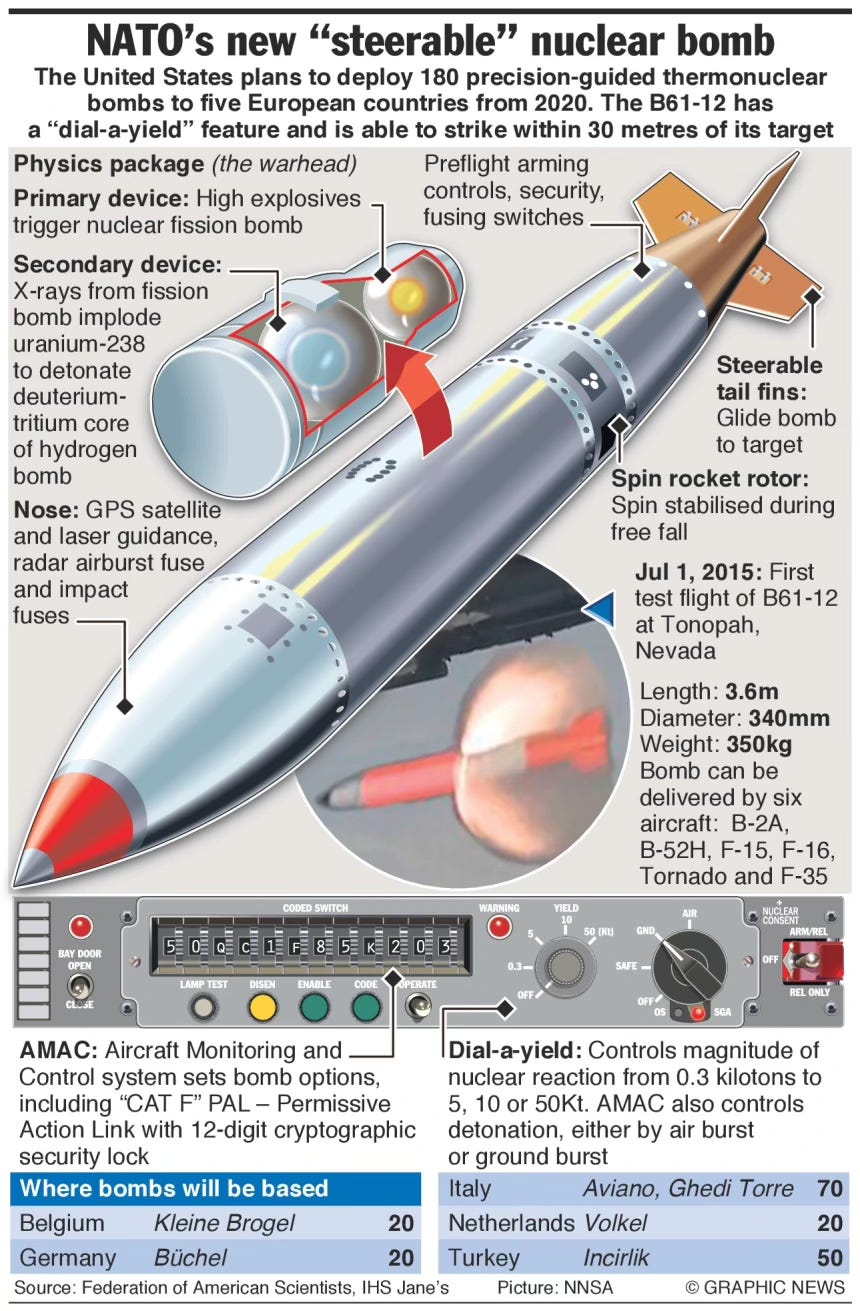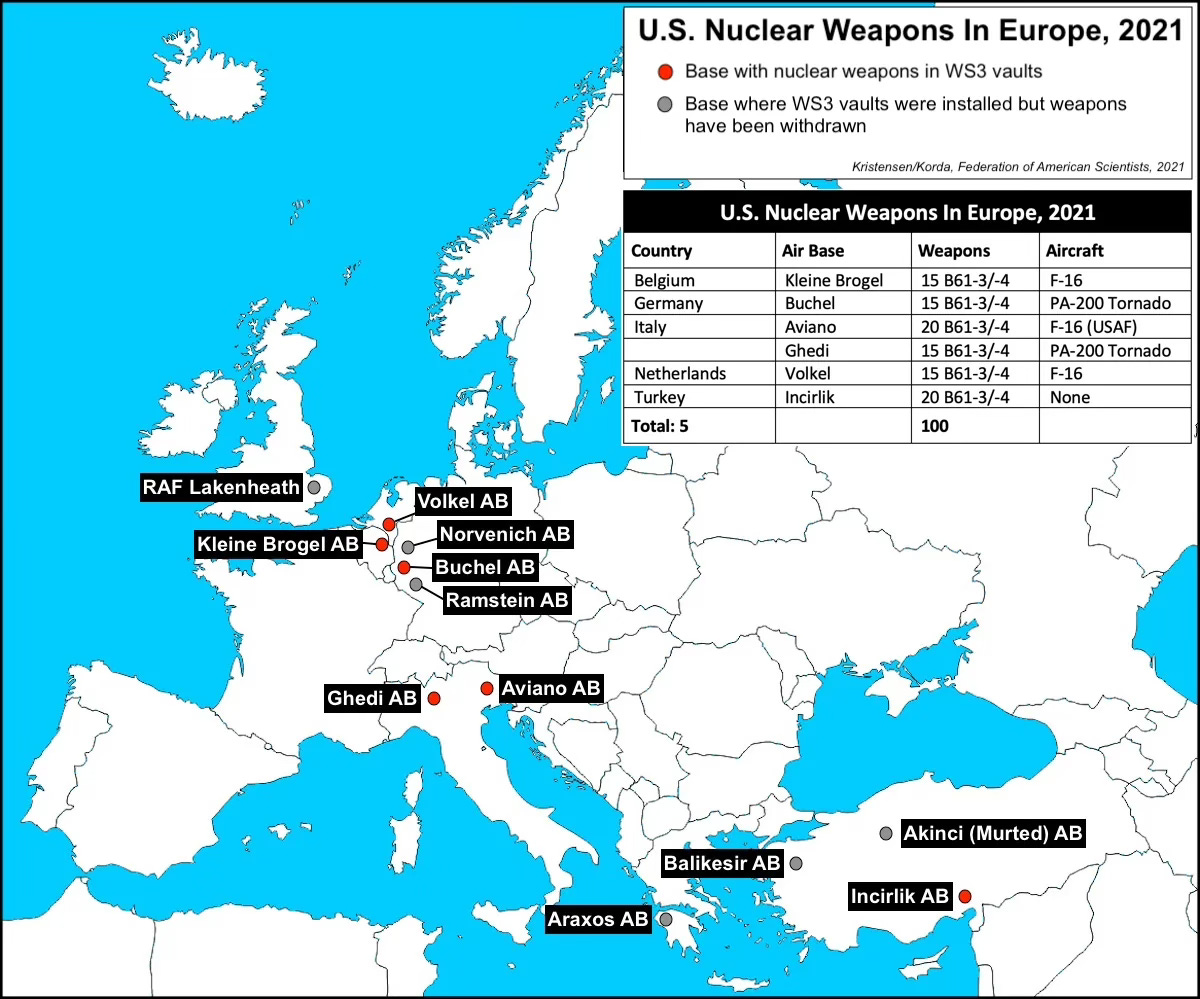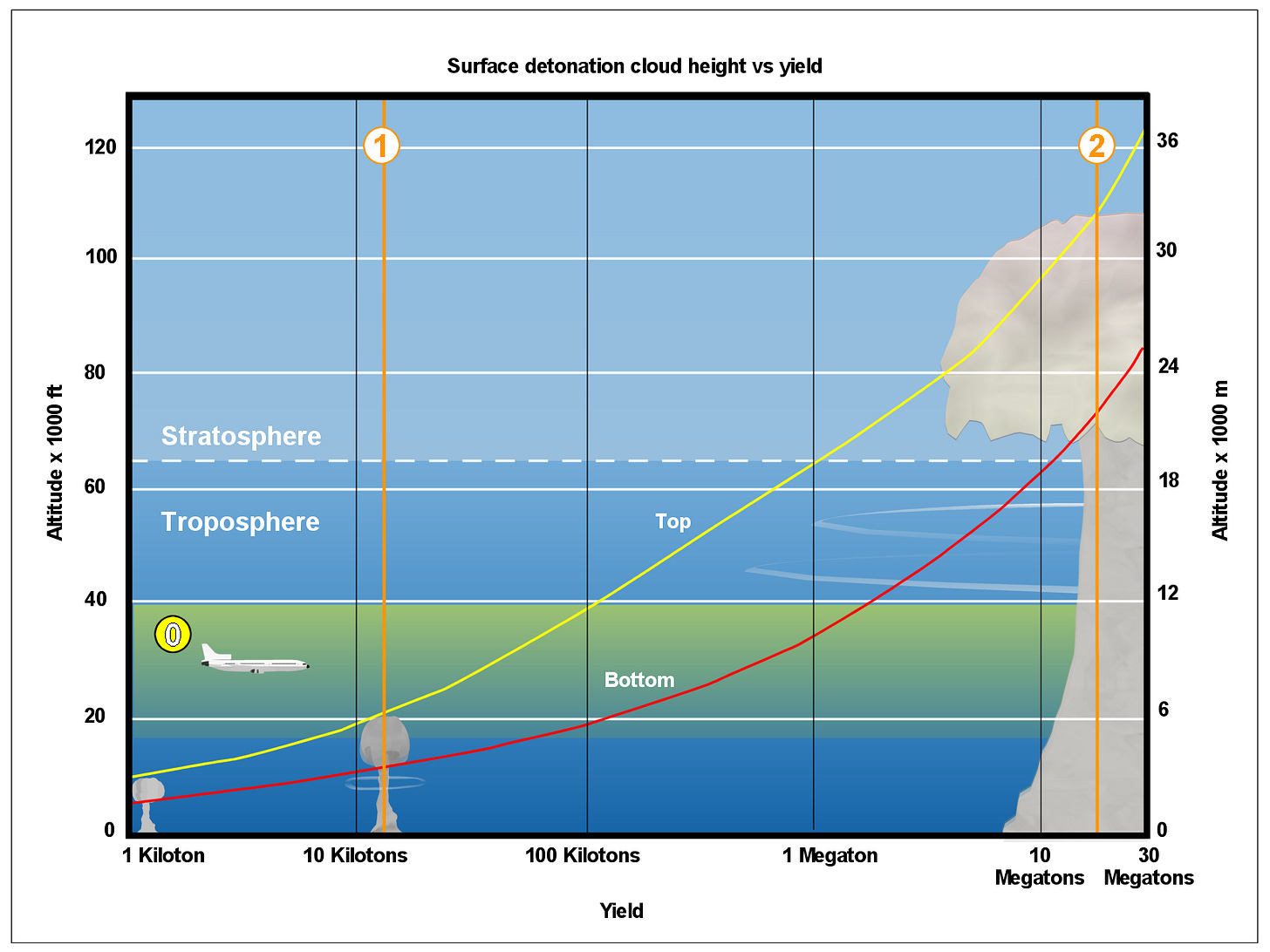"PINNACLE NUCFLASH"
Unacceptable Risk: Nukes in Turkey
Washington DC 7 NOV 2023
It’s time to start worrying about the bomb. The B-61 in particular.
“PINNACLE NUCFLASH”
is an an event, accident, or incident that could create the risk of a nuclear war. This report has the highest precedence in the OPREP-3 reporting structure.
Air Force Instruction (AFI) 10-206, 18 JUNE 2018
Rationale
To deter Russia, Iran and others in a volatile region contending with multiple hot war zones, the US maintains ~50 B-61 nuclear gravity bombs (~ half of the total NATO arsenal) in specially made security vaults (WS3) on the Incirlik NATO base in Turkey.
Advantages
These weapons provide NATO with significant deterrent and operational value, by vastly complicating adversary calculations. They are forward based so they can be deployed by short range attack aircraft. For example, allied F-16s are equipped, trained and ready to drop these weapons. In a crisis, the flight profile of an F-16 will not be as alarming as long range bomber deployments from the continental US. This confers a range of advantages to these weapons systems. Nor do the advantages end there.
Named after the year it was conceived, the B-61 gravity bomb provides a unique capability compared to the rest of the nuclear triad. Unlike ballistic or cruise missiles, gravity bombs do not present advanced warning of delivery with a well-known, detectable, trajectory. Free from the tyranny of trajectory, the bomb can be placed on a target with exacting precision with respect to - height, angle, azimuth, and direction - taking advantage of natural features like mountains that offer particular detonation/fallout characteristics. This is not always possible with other delivery systems.
They can be carried by a wide range of aircraft, from the B-2 to an allied F-16. They are not easily distinguishable from any other bomb on a wing mount of a fighter and are unobservable in the belly of a bomber.
The B-61 is a variable yield weapon. This means that its destructive power can be changed to fit different mission profiles. Sometimes referred to as “dial-a-yield” the B-61 can be pre-programed to detonate with a strength of between 0.3kt to 340kt (the bombs used on Japan were ~15kt). Combined with its infinitely configurable delivery profiles, the variable yield B-61 is by far the most “flexible” nuclear weapon in the US arsenal.
Disadvantage
Against this list of significant advantages must be weighed a singular disadvantage: security. There is no doubting that the threat profile against Incirlik has drastically changed from the time it was originally decided to deploy the weapon.
Located just 70 miles from the Syrian border, Incirlik is a bit too close to the acton. In 2010 the entire world was taken by surprise by the “Arab spring”. Turkey’s internal experience was not like other states in the region. But next door in Syria, the spring transformed into an on-going civil war that has deeply impacted Turkey. In 2014, ISIS terrorists reached the border 70 miles from Incirlik. Turkey is a NATO member with a strong military. They pushed back hard against the threat.
However, that very strength itself became a potential threat when there was an attempted military coup in Turkey just two years later. Had events gone a different way, and had the Turkish military (or a splinter faction) been turned against Incirlik to seize the bombs for political leverage (for example), there is precious little the US forces at the base could do about it. Avoiding a deep dive branch and sequels analysis, suffice it to say US response options might have lead to a major war with a NATO ally. Whether Turkey would even be an ally after a coup - and many other complications - excluded. The point being, any such scenario gets very complicated, very fast. Having nuclear weapons sitting in the middle of that caldron is incredibly ill-advised.
This week there was a new reminder of how things could change at the drop of a hat. In the wake of the devastating surprise terrorist attack inside Israel, and related psychological operations, “the Arab street” rose up in outrage all around the world. Even in sleepy Australia, far away from the world’s troubles, protestors gathered at the iconic Sydney Opera house chanting "gas the Jews". To anyone that knows Australia, this is truly astonishing.
Protests spread like wild fire and shifted in unexpected ways. At first it looked like protestors were conflating support for the Palestinians people stuck in Gaza with their oppressors.1 Then it became clear that large swaths of people (Arab and non-Arab alike), were in fact pro-Hamas. Pro-terror. As indicated by the chants at the cathedral of high culture down under.
Protests came within yards from Incirlik’s nuclear weapons. In this instance, the protests were relatively minor and turned away without much indecent. What about next time? Or the time after that?
In an era of strategic surprise (Arab spring, ISIS 70 miles from the warheads, the Turkish coup, Hamas surprise attack, protests yards from the weapons), in a region of high volatility; the advantages of the B-61s in Turkey are completely outweighed by multiple threat vectors - known and unknown.
Foreseeable Implications
Protection of nuclear weapons is a no fail mission. Leaving them in Turkey only encourages a no win situation. Whether through a coup or terrorism, the psychological, propaganda and political value of anti-NATO forces merely gaining access to the NATO base at Incirlik would be profound. It would demonstrate acute weakness at exactly the spot where overwhelming strength must never be in question.
Human hostages have completely changed the game in the Hamas-Israel war. Even if the WS3 vaults and Permissive Action Links (PALs) worked perfectly, possession of the terrain alone would be treated no differently than possession of a workable bomb. Taking just one 350 kiloton nuclear bomb hostage - let alone 50 of them - would result in world history changing events.2
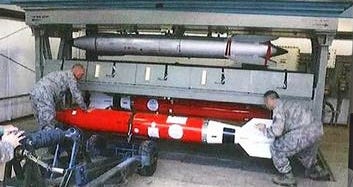
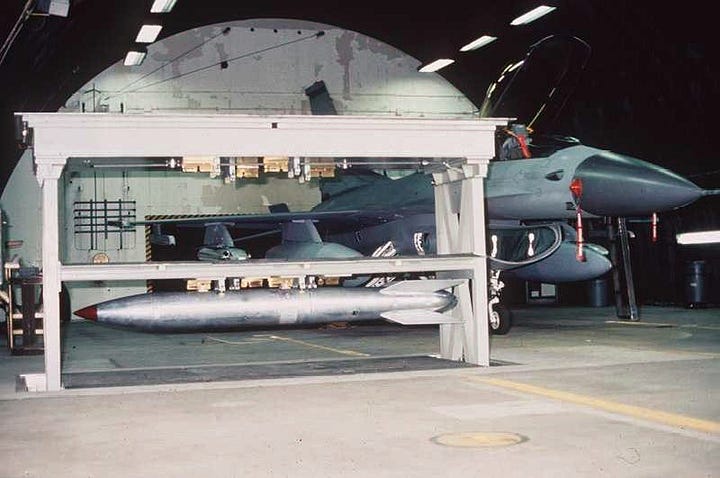
Regardless of the posture of the Turkish military in any scenario, the US military would successfully recover the weapons, no matter the cost. The point is why take such risks?
The B-61s must be relocated to other NATO facilities ASAP
This can be done quietly and intelligently under the guise of budgetary, operational, training, or myriad other ‘necessities’. Plausible excuses can be found and made that satisfy domestic and international scrutiny. Or pay the Turks off with an acceptable trade. As for the need to have the weapons forward due to the combat radius of fighter aircraft, that argument is negated by air-to-air refueling and 11 other WS3 NATO equipped bases.3
Turkey is a critically important ally of the US and Europe. It holds the key to new accessions to NATO. Finland was allowed in after concessions were made to Turkey, but it has been holding back on Sweden. Turkey has bottled up the Black Sea, forbidding the transit of Russian warships to the Med. It has sold much needed drone technology to Ukraine that has made a material difference to operations prior to the emerging stalemate recently acknowledged by the Ukrainian Chief of Staff.
In some respects, Turkey has been a bulwark against extremism. In others, a bystander or worse. Founded by Kamal Ataturk, embracing modernism, secularism and capitalism, these values have been contested in the past few decades. Like all the states of the region, it has to manage its extremists within, and that tightrope occasionally shudders. A member of NATO, its internal politics prevented its accession to the EU. That was a painful insult that some point to as encouraging extremism. That is ironic because EU standards were created and imposed in order to encourage the opposite reaction - namely reform of politics and economics to become aligned with democratic principles.
Withdrawal of the B-61s will be considered a major insult to Turkish pride. It will undermine confidence in the regime and might precipitate further instability in the country and region. But no one can exclude those outcomes regardless of the location of the bombs. All of the arguments against moving the weapons are important. They are not more important than preventing a clearly foreseeable global security crisis of unprecendented consequence.
A little hurt pride might swing Turkey further into Russia’s camp. This would be a very negative development. However, the Turks are not stupid. They know they are walking a fine line and that Russia is not their friend. One might respond that equally, they understand the importance of the weapons for their country and will always act accordingly. The problem is they do not have full control of events in and around their country in the same manner as other NATO nuclear partners.
Moreover, if done in a careful clandestine way, dribbling them out in ones and twos and replacing them with inert doubles under the guise of training exercises etc (for just one possible example), it may be some time before any realization is made that a change has taken place. Just think of the terrorist or coup forces holding the base, prying open the WS3 vaults, only to discover they are the proud new owners of a stainless steel shaft filled with sand!
Conclusion and warning
A no fail mission in a no win situation demands immediate resolution. If the worst case situation happens, never say this was an intelligence or imagination failure. This is the warning. Act on it.
Hamas ≠ the Palestinian people. Netanyahu ≠ the Israeli people. In a sense Hamas and Netanyahu are both holding the Palestinian (and Israeli) people hostage. See this particularly interesting and alternative analysis.
As previously noted, the possible scenarios are endless. Each one requires extensive branch and sequel, or “if this, then that”, analysis. That could go on for pages.
It may be time to conduct a thorough strategic and operational review of all NATO nuclear facilities as a precautionary matter.


